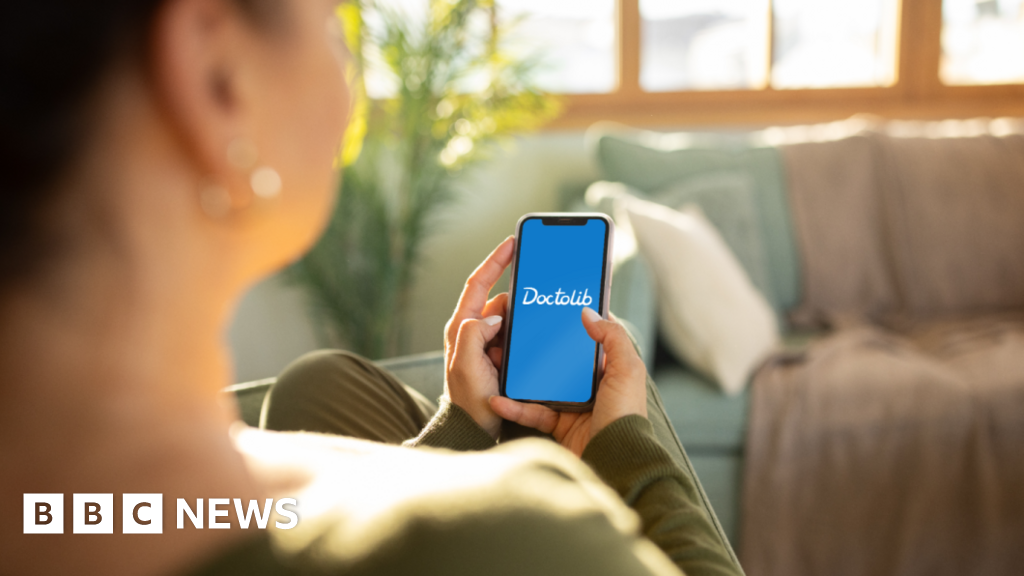Carrie King,Technology Reporter
 Doctolib
DoctolibDoctolib is one of the French start-up scene’s great success stories.
Founded in 2013 by Stanislas Niox-Chateau and his three co-founders, the software firm assists healthcare providers with administrative tasks, primarily appointment booking and management.
Rather than having to contact practices directly, patients can use Doctolib to check availability and book medical appointments online.
In a world where we book everything online, this might seem like a simple innovation, but in the slow, data-sensitive, bureaucratic healthcare industry, any software that can reliably simplify complexity and free up time is a welcome change.
Doctolib is free for patients. Medical doctors pay a monthly subscription fee of €139 ($151; £120) to use the core product, with various add-ons and upgrades available. There are also separate packages for hospitals and other practitioners like physiotherapists.
Already doing well by the time the pandemic hit, Doctolib benefited from the sudden boom in telemedicine, and partnering with the French government to facilitate the Covid-19 vaccine rollout made the company a household name in France.
The firm says it covers almost all of the French population, and it was valued at around £5bn during its last funding round in March 2022.
 Doctolib
DoctolibBut repeating that success in other markets has proved challenging.
Doctolib expanded into Germany in 2016, but after eight years in the German market, the company has only recently begun to gain traction.
Of the 900,000 healthcare providers and 80 million patients that have signed up to use Doctolib, Germans account for 200,000 providers and 19 million patients.
Adapting from the centralised French system to Germany’s federal setup was just the first among many obstacles that tested the flexibility of the platform.
“There is no [one] German market entry,” says Nikolay Kolev, managing director of Doctolib Germany.
Each of Germany’s 16 federal states was a different market the firm had to adapt to.
However, the complications that initially make it hard to get off the ground in Germany also protect established companies and make it difficult for new competitors to pose much of a threat.
Dr Carol von Wildhagen, a medical doctor and health venture partner at Munich-based Caesar VC who previously led the German arm of Platform24, a Scandinavian telemedicine provider, says existing closed systems in practices are also a major barrier to entry.
“The companies who make and sell the many, many, many [practice management systems] construct them as fortresses, so it’s very hard to connect any third-party software to a doctor’s practice software. That makes it very hard to deliver value to the doctor,” she says.
“I can see how the big incumbents who traditionally produce practice information systems would be worried… they could become leapfrogged quickly because their systems are old, look old, feel old, are not very user-friendly, and might be replaced by something cloud-based that focuses on user experience.”
 RAISE Summit
RAISE Summit“I think home field advantage always plays a big role in the European start-up scene”, says Liam Boogar-Azoulay, who founded France’s bilingual startup blog, Rude Baguette, in 2011, and is now a co-founder at Waypoint AI.
“Germans like buying from German companies and I think that can’t be overstated. It’s the same for almost every country,” says Mr Boogar-Azoulay.
Perhaps part of the reason for this reticence about non-German companies, and a hesitation to embrace digitisation more generally, is a belief that only a homegrown company will understand the German desire for high levels of data security.
Doctolib’s 2022 acquisition of French data encryption startup, Tanker, may be a gesture toward setting data security-conscious minds at ease.
But Mr Kolev doesn’t believe that data security is really why the German system has been slow to change.
“The best available security and privacy should be our baseline if we really want to move this industry forward. So I don’t think that data privacy is the problem in the German healthcare market. I think it’s more the fax machines.”
He’s not joking. A 2023 study by German digital advocacy group, Bitkom, found that 82% of German companies still use fax machines on a regular basis. In many cases, fax is the go-to method for sharing medical information.
Increasing digitisation has been on the German state’s agenda for a long time. Germany’s National Association of Statutory Health Insurance Physicians estimates that healthcare practices spend around 61 days per year on paperwork alone.
Doctolib relies on the move away from paperwork to digital services.
“[Outdated tech is] not a problem that can’t be overcome. It’s just a barrier to adoption,” says Mr Boogar-Azoulay.
“I think just having the French tailwinds and having that market behind them, they’re gonna be able to throw money at the problem for a long time. It doesn’t have to be efficient. They can lose money in the German market for 10 years just to get over that barrier of fax machines.”
And it’s easy to see why Doctolib is willing to invest a lot in making their operation in Germany work. As Mr Boogar-Azoulay points out, the market opportunity is “insane”.
As Germany’s 84-million-strong population continues to age and doctor shortages grow, the healthcare system sorely needs widespread optimisation to alleviate pressure and reinstate Germany’s reputation for efficiency.
The most recent available statistics show that Germany spent €495bn on health in 2023, around 13% of its total GDP. Germans visit the doctor around 9.6 times per year, which is significantly more often than most other Europeans.
In 2022, German primary care physicians saw a weekly average of 254 patients, where their French counterparts saw around 114, with UK doctors seeing 110.
Lessons learned from expanding into Germany are visible in how Doctolib approached the Italian market in 2021. Though Italian user numbers are still low, Doctolib acquired Italian competitor Dottori.it to gain an initial foothold in the market.
And what about crossing the channel?
“The UK is certainly an interesting one. But having said that, Germany, France, and Italy alone are 55% of the European healthcare market. So if you’re well positioned there, that’s already half the rent,” says Mr Kolev.


